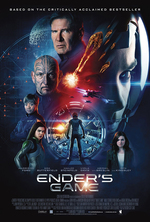Film Screening 26th February, 2014

Ender’s Game
7:30 PM, 26th February, 2014
- M
- 114 mins
- 2013
- Gavin Hood
- Gavin Hood
- Asa Butterfield, Harrison Ford, Abigail Breslin, Ben Kingsley
After our planet was almost stolen from us by a race of aliens called the Formics (who are exactly what they sound like), the world’s leaders decide that what we need to defend us from the inevitable second attack is a generation of child warriors (or teenagers will do at a pinch). Children have always been better at the video games that the new interstellar warfare seems to resemble, so the most promising candidates are whisked off into totalitarian boot camps and set to work playing games against one another.
The most promising of these children is an unnervingly rational boy called Ender (Butterfield). Ender is given more games to battle and puzzle his way through than the other recruits, and outside the games is given the even bigger game of fighting for respect and survival in the social pecking order. He’s quite a creation: most of the time, we know exactly what he’s feeling, and – up to a point – thinking, and we understand and empathise with him perfectly. But he never seems to belong to quite the same species we do – which makes him all the more fascinating to watch.
There’s a heavy level of suspense every time we see Ender’s eyes flicker and wonder if his next move will be enough to keep him in the game. Many characters forget the larger issues in these games. We in the audience at times do, too. The question is: will Ender?
Henry Fitzgerald